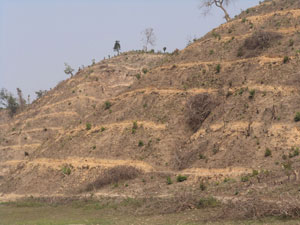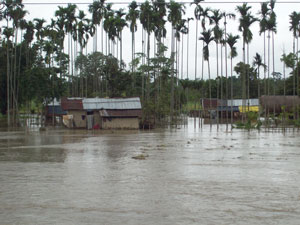Archives
Land Policy

Whichever State Government ignores the need of formulating a comprehensive land policy may face a situation of conflict and tension over ownership of land or transfer of Government land to encroachers, whatsoever, with the growth of population.
In Assam, the land law that has been put to use is very old. Replacing the archaic piece of legislation with a new
inclusive, progressive statute is the exigency of the hour to prevent dispute over land ownership and rapid shrinkage of Government, forest and agricultural land as well as land in tribal belts and blocks. With the absence of a progressive land policy, the existence of land Acts which are archaic in nature having their genesis in the British colonial days and poor land record management have triggered a situation of contention and tension in the State. What is worse, there is no sign as yet visible at the end of the tunnel of this improving in the near future. It will improve if the Government comes up with a comprehensive land policy and the desired amendments to the existing slack land – holding legislation to make them relevant to the changing times. However, it is a pity that the land – management issue is not getting the due and prompt attention it deserves given the acrimonious situation that is arising more often than not in some parts of the State including the capital city Guwahati, out of disputes over land rights.

Why is the Government dilly dallying in formulating a well – considered land policy which can address the lacunae in the existing archaic pieces of legislation to remedy the situation is difficult to fathom. That it is dithering in this regard does encourage people to encroach upon or illegally settle on Government land in urban areas, agricultural land and even on land in tribal belts and blocks and gain ownership rights without any hassle after a reasonable spell of time. The absence of authentic records pertaining to different types of land is also triggering large – scale, organised encroachment in Guwahati and other urban areas. Lack of adequate safeguards has in the recent times witnessed diversion f agricultural land for industrial and commercial purposes.
| Cross – border infiltration over the decades, shrinkage of arable land in Assam due to the recurring floods and erosion are some of the contributing factors that have been responsible for creating hurdles in the way of attaining self – sufficiency in food – grain production. |
Then, the lacunae in the existing land legislations on such vital issues as holding and transfer of land in tribal belts and blocks is also enabling outsiders and immigrants to gain ownership of land of the indigenous people. Candidly, the incidence of slipping of land from the latter is growing as a result. An ever – increasing population in the State as is evident from the 2011 census – report that reveals 45.5 lakh population growth in the last decade, indeed a huge army, that can be attributable to large – scale migration from the neighbouring States, cross – border infiltration over the decades, shrinkage of arable land in Assam due to the recurring floods and erosion are some of the contributing factors that have been responsible for creating hurdles in the way of attaining self – sufficiency in food – grain production.

Be that as it may, the indigenous people are, in fact, paranoid about their land holding rights gradually slipping out of their hands in tribal belts and blocks as well as arable lands with the settlements and ownership transfer of those lands to the outsiders, the suspected Bangladeshis in particular. The transfer of ownership of land in these areas, if it continues, will supposedly further embolden them to encroach upon the land of the indigenous people, which may in turn lead to unavoidable social unrest in the not – too – distant future. In addition to land in tribal belts and blocks, vast tracts of forests and other Government land too has regrettably witnessed large – scale encroachment and transfer of ownership to those both from within the State and outside, a situation that hardly augurs well for the future.
What the local populance however are genuinely in fearful anxiety about is a likely large – scale encroachment in future, besides disputes over land rights that may be triggered by gradual shrinkage of land due to the endemic floods and erosion. Arguably, a few weeks ago, the situation in Assam became a little surcharged following the movement spearheaded under the stewardship of the Krisak Mukti Sangram Samity (KMSS) president and RTI activist Akhil Gogoi in protest against the diversion of different types of land including agricultural land for industrial and commercial as well as residential purposes. It is true that there are some instances of business groups and construction companies procuring agricultural land in the outskirts of Guwahati for real estate business. One such case was revealed recently when one of them had allegedly procured 150 bighas of this type of land at Mirza about 20 kms from the city for constructing a township.

The State Government’s recent decision to provide settlement to the landless in Guwahati can be a welcome move if they are settled in residential areas other than on its 18 forested hills including reserved forests and wetlands in and around the city. With the alleged go – slow approach on the part of the administrative machinery, the city’s eco – system has already been adversely affected by growing unplanned settlements on these areas. If the people are settled in forests and wetlands, it will pose a serious ecological crisis in the city. In this sorry state of affairs, it is incumbent upon the organisations like KMSS to pitch the demand for the settlement of the landless in the residential areas of the sprawling city. However, what it has, instead, demanded is their settlement on forest land and wetlands to the utter surprise of all, which is untenable. KMSS should rather refrain from raising such injudicious demands. On the other hand, the authorities should be firm in evicting the encroachers from forests and wetlands. If they are not resolute in the decision that has been taken recently, it will encourage further large – scale organised encroachment on such lands in the near future.
However, the Gauhati High Court has of late asked Dispur to review its existing provisions in land Acts that encourage people, even those having land in rural areas, to come to Guwahati or any other town to illegally settle on Government land in urban areas, and become entitled to ownership at Government rate which is far below the market value of the land after a certain period of time. Its other land Acts originating in the British colonial days are also equally adversely impacting the overall land management policy, a phenomenon that is affecting the interests of the local people who are afraid of losing their sway over their land in the near future.
They say that time is a great healer. Yes, it is so; but this is not true in all cases. Land management is not easy. In Assam, the issue has been complicated over the years in the absence of an inclusive land policy and the ineffective, old laws. Under the circumstances, if the Government goes slow on bringing in some much – needed changes in its land policy and also archaic Acts for protecting the interests of the local people through prevention of diversion of agricultural land, as also to prevent large scale encroachments and settlements on hills, forests, Government land and wetlands, the situation may turn more complex than what it is now. Therefore, prudence says that the sooner the exercise of the necessary changes in both the policy and the existing Acts is undertaken, the better for the State and its suffering people.

